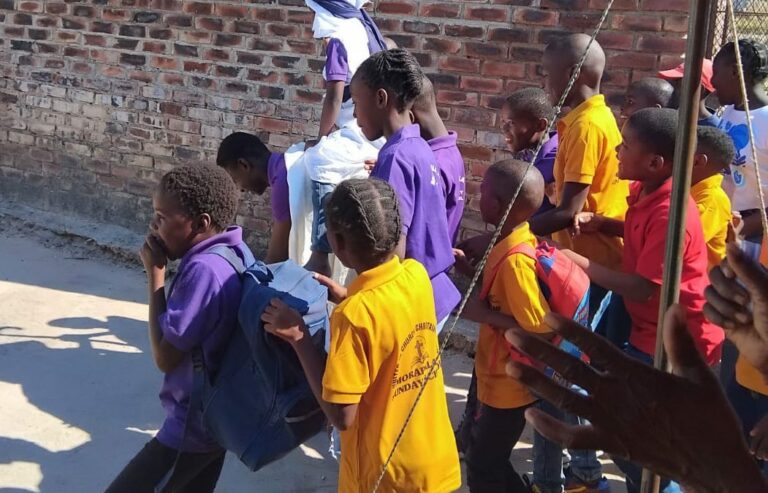
Helping Kids in Limpopo Live God’s Word
Walk Thru the Bible and instructor Ishmael Mutumwa are helping kids in Limpopo, South Africa, live God's Word!
Read More“My 13-year-old nephew from another region of Honduras was visiting me and my family,” says Antonio. “I had brought him here to help him out.”
Antonio would send his nephew on errands or send him to buy something at the grocery store. But he started noticing that his nephew was bringing snacks or drinks home. Curious, Antonio calculated the amount of money he’d given his nephew for the items he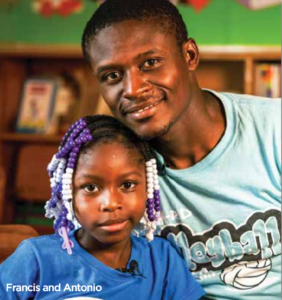 sent him to purchase. “I didn’t give him enough money to make my purchases plus the snacks or drinks he was bringing home,” said Antonio. “The money didn’t add up.” So Antonio confronted him, and the boy told him that the money for the drinks and snacks came from a gang member who was trying to recruit him into the gang.
sent him to purchase. “I didn’t give him enough money to make my purchases plus the snacks or drinks he was bringing home,” said Antonio. “The money didn’t add up.” So Antonio confronted him, and the boy told him that the money for the drinks and snacks came from a gang member who was trying to recruit him into the gang.
Antonio sent him back home.
Being a kid in Tegucigalpa is tough.
Gangs run several of the neighborhoods in Tegucigalpa. Poverty, a lack of jobs and opportunity, fatherlessness, and more—all contribute to the high levels of dangerous gang activity in this capital city of Honduras.
“Gangs entice children usually around ages 12-13, sometimes as young as 9 or 10,” says Antonio. They give kids something they want, like snacks and food, and something they need, like community and money and family.
God is planting seeds of hope in hearts and lives in Tegucigalpa, Honduras.
In 2006, a family from Memphis, Tennessee, went on a mission trip to Tegucigalpa where they saw great needs, especially among children. With God’s guidance, they began to help by feeding 30 children in one of the neighborhoods of Tegucigalpa.
Today, from those beginnings, the ministry of Point Honduras has grown to serving 755 children each day in four centers in some of the most dangerous neighborhoods in the city. The programs at the centers run from kindergarten through 6th grade.
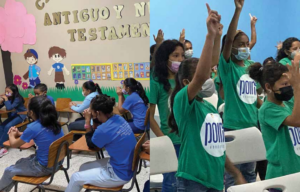
Point Honduras has always taught the Bible to the children in their centers, but this year, they partnered with Walk Thru the Bible to teach them our otLIVE and ntLIVE (our big picture events teaching the storyline of the Old and New Testaments). Alejandro Oviedo, our regional director for Central America, and Laura Oviedo, our children’s coordinator for the region, along with their team, trained the teachers of Point Honduras to teach these two Walk Thru events.
Walk Thru the Bible launched a global children’s ministry almost two years ago, and through our otLIVE and ntLIVE, we are sharing the hope and truth of God’s Word with children around the world. By teaching the big picture story of Scripture, children learn that the Bible is Truth, it is God’s Word, and that God loves them and wants to have a relationship with them.
The hope of God’s Word Led by Dr. Ivan Lainez, the heart of Point Honduras is to bring the gospel of Jesus and the hope of God’s Word to the children, families, and neighborhoods they serve. This is so clearly demonstrated in their commitment to minister to the physical needs as well as the spiritual needs of the children in their programs, as well as ministry to their families. It is Dr. Lainez’s passion— and that of all of his teachers and staff and medical teams—to reach more and more children and their families with the gospel of Jesus, for God’s kingdom.
But the majority of the children who are enrolled at Point Honduras come from disadvantaged homes, single parent families, and neighborhoods that are ruled by gangs. “We work in very poor and very dangerous neighborhoods,” says Dr. Ivan. “There is a lot of crime, violence, and insecurity. These neighborhoods are controlled by gangs,” he says. “All of the children have some connection to gangs—their parents, siblings, aunts, uncles may be gang members. Their cousins, friends, neighbors, even acquaintances, are gang members. It is the environment, the reality, of poor neighborhoods,” he says.
And yet, Point Honduras is right there in the middle of it all, coexisting with the gangs. “Over 14 years of faithfully serving the children and their families, the work of our teachers, our staff, our directors—many of whom actually live in these neighborhoods—has opened doors for us to have a relationship of respect with the gangs,” he says. “This relationship of respect has been the fruit of the work of showing them the love of Jesus, of opening the doors of our clinics, of opening the doors of our dining rooms, of opening the doors of our school tutoring centers to serve them. We bring the message of hope, of the gospel of Jesus, of the truth of the Word, as well as working to meet their deep needs, physical and spiritual,” says Dr. Ivan.
Raising children in Tegucigalpa is difficult. From gangs to poverty to single-parent households to crime and drugs and more, there are many challenges for parents and grandparents and teachers to teach children in the ways of God and His Word.
In addition, the pandemic was particularly damaging to the already-shaky economy. And then, Hurricanes Eta and Iota hit Honduras, causing billions of dollars of damage. Crops were destroyed around the country, and in Tegucigalpa, a lot of the neighborhoods are built on hillsides which are subject to landslides, especially in heavy rains. Many homes were destroyed in the resulting deluge and flooding and landslides. These factors have caused poverty to increase by 10%—up to 70% of the population of Honduras.
Tegucigalpa suffers from dangerous gang violence. Gangs begin enticing children and adolescents to join the mara. In many cases, the gangs offer the children something they are not receiving already, such as family, community, money, affection, a sense of belonging. “In some cases,” says Vilma, a single mother of three, “not having a father figure affects children because they are looking to their parents as examples. Not having a father figure will make them look for affection elsewhere. And gangs offer them that and other things that they want.”
Dr. Ivan says that at ages 12-13, the gangs can mold and shape the kids because they are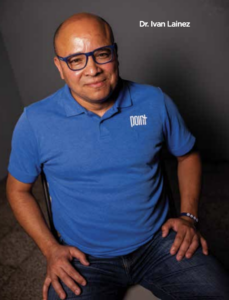 entering adolescence, a very difficult stage of life. “There are not many opportunities for children in the neighborhoods. Many of them have to work, many of them stop going to school, and many of them may spend a lot of time alone in their homes. Many of them live with their mom or their grandparents or an uncle who doesn’t take care of them,” he says. “They are victims of their environment, and when they feel that there is no sports activity, no educational activity, no safe place to go, the mara becomes their family,” he says. “The gang becomes the only opportunity they have to be part of something.”
entering adolescence, a very difficult stage of life. “There are not many opportunities for children in the neighborhoods. Many of them have to work, many of them stop going to school, and many of them may spend a lot of time alone in their homes. Many of them live with their mom or their grandparents or an uncle who doesn’t take care of them,” he says. “They are victims of their environment, and when they feel that there is no sports activity, no educational activity, no safe place to go, the mara becomes their family,” he says. “The gang becomes the only opportunity they have to be part of something.”
Pastor Javier, the administrator of one of Point’s centers, says, “We have children who are abused, moms that have a hard life, husbands that have left them. They have all this pressure and sometimes begin abusing their kids. As a result, some kids have feelings of worthlessness, low self-esteem, feeling that they have no value.”
“It’s very dangerous here, our society,” says Paola, mother of two. “It’s difficult to raise children here, but thankfully, there are people and organizations like Point and Walk Thru the Bible that help our children to have the foundation of Christ and the Bible, first.”
When children come to Point Honduras, they are loved and cared for and taught and fed a nutritious meal. Their parents know they are in a safe place and they are being educated and taught the Word of God. They are part of a growing community that is making an impact and planting seeds of hope in the neighborhoods. Everyone associated with Point Honduras—from Dr. Ivan and Ana Rivera (the communications officer), to the center leaders, the teachers, the staff, the cooks, the medical teams who staff the clinics, and more, all make a special effort to shower love on the children—to listen to them, to council them, to help them with their studies, to feed them well, and to teach them the love of God and His Word.
Point Honduras is making a difference, says Pastor Javier, changing minds and hearts,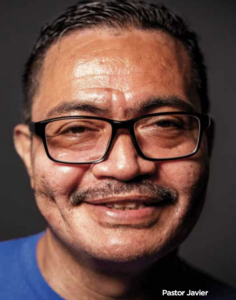 instilling value and worth into the kids, teaching them about their heavenly Father who loves them. During the week, Pastor Javier visits with the families, the parents and grandparents, to pray and talk with them. He also councils the children, taking the time to pour into their lives and build a relationship with them.
instilling value and worth into the kids, teaching them about their heavenly Father who loves them. During the week, Pastor Javier visits with the families, the parents and grandparents, to pray and talk with them. He also councils the children, taking the time to pour into their lives and build a relationship with them.
At Point Honduras we want to continue creating opportunities,” says Dr. Ivan. “Opportunities that allow us to share the gospel, teach God’s Word, meet needs, and love the next generation of Hondurans who are going to change this country.”
Dr. Ivan believes that Christian ministries must work together. “Reaching people for Christ is not a job we can do while keeping our distance from each other,” he says.
In 2019, Alejandro Oviedo, Walk Thru the Bible’s Regional Director for Central America and the Caribbean, began a partnership with Point Honduras to launch a pilot program to teach Walk Thru the Bible’s otLIVE and ntLIVE (our big picture overview of the Old and New Testament) to the children they serve. Alejandro and his team trained 11 Point teachers, but the pandemic lockdowns kept them from teaching otLIVE and ntLIVE to the kids.
In November 2021, when the centers began to reopen, Alejandro and his team conducted a refresher training for the Point teachers, and the teachers taught otLIVE and ntLIVE in their VBS program in their communities in December.
In early 2022, Dr. Ivan and the teachers incorporated otLIVE and ntLIVE into the Bible curriculum that they teach in their centers every day. And now, all the kids know all 80 handsigns and the storyline from otLIVE and from ntLIVE .
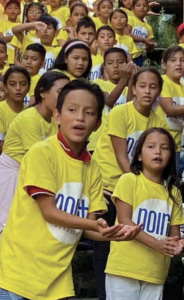 “When I talked with Dr. Oviedo about otLIVE and ntLIVE, I was excited about how innovative it was to be able to teach the Old and New Testaments as well as present the gospel through the big picture storyline and the handsigns,” said Dr. Ivan. “We didn’t really know what the results were going to be. I really could not have imagined it, but I know that with Walk Thru the Bible, we are impacting the lives of our children forever.” Dr. Ivan sees the children practicing their handsigns with each other in the halls, at the lunch table, even in the neighborhoods. Parents tell him stories of how their children are reading the Bible, teaching what they’ve learned to their siblings and cousins and friends.
“When I talked with Dr. Oviedo about otLIVE and ntLIVE, I was excited about how innovative it was to be able to teach the Old and New Testaments as well as present the gospel through the big picture storyline and the handsigns,” said Dr. Ivan. “We didn’t really know what the results were going to be. I really could not have imagined it, but I know that with Walk Thru the Bible, we are impacting the lives of our children forever.” Dr. Ivan sees the children practicing their handsigns with each other in the halls, at the lunch table, even in the neighborhoods. Parents tell him stories of how their children are reading the Bible, teaching what they’ve learned to their siblings and cousins and friends.
Point Honduras has always presented the gospel and taught the Bible in their curriculum, and their teachers have always tried to have interactive materials so the children could learn the Bible in the best way. But the difference with Walk Thru the Bible, says Dr. Ivan, “is the children are learning the Bible in a new way. They are learning by doing. They are actually walking through the Bible.”
Naila, a 5th and 6th grade teacher at one of Point’s centers, believes that Walk Thru the Bible helps the children go deeper into the Bible. “Before the training, I was simply narrating a Bible story. But after the training, everything changed. otLIVE and ntLIVE are like story-telling with handsigns,” she said. She found that this way of teaching the Bible captures and holds a child’s interest and attention, and they are more eager to learn the stories and the handsigns. They are also more willing to share the stories with their families and friends.
“I’ve had parents ask me, ‘What is this that my children are learning?’ The children are going home and sharing the stories and handsigns with their mothers, their siblings, their friends,” Naila said. In the beginning, some parents were worried, wondering what their children were sharing because gang members use handsigns in their communication with other gang members.
“At first I thought it was a game,” says Paola. “So I watched [my son] and his little brother, and I asked him [the oldest, who is 9] what he was doing, what he was learning. In our environment in Tegucigalpa, the gangs make signs. I thought that by interacting with the other children he was learning something wrong. I got involved with him and he taught me that they weren’t bad signs, but rather it was the Bible story they taught him at Point,” she says. She asked him for an example, and he said, “Look, mommy, this is creation, the first part of Genesis” as he shows her the hand sign for creation. Paola believes it’s so important for a child to learn the Bible from an early age, because as “Proverbs 22:6 says, ‘Instruct a child in the way he should go.’ I want him to follow the path of Christ,” she says.
Sara, another Point teacher, has been personally impacted by otLIVE and ntLIVE as well. “This has been an unforgettable experience for me,” she said. “I have been able to practice otLIVE and ntLIVE in my own life first—and it has been such a blessing—and then teaching it to the children,” she said. “I have also taught it to other people.” She finds that the children are more attentive when listening to the storyline of God’s Word with otLIVE and ntLIVE, and they remember it. “I can see that it is making an impact in their lives. They are learning to apply the Bible to their lives. And they remember the storyline and handsigns from week to week,” she said.
Parents and grandparents recounted that their children come home and teach them the Bible story, Bible verses, and handsigns they learn each day. “I was not raised in a Christian home,” says Lorena. “My sister, Sara [Point teacher] led me to the Lord when I was pregnant with my daughter, Genesis. Sara convinced me to enroll Genesis at Point Honduras because of the Bible teaching and the valuable education they provide. Each day Genesis comes home and tells me the Bible story she learned that day.” Lorena noticed that 11-year-old Genesis looks up the Bible verses and they talk through what she doesn’t understand. “This is also helping me to know and understand the Bible better, too,” Lorena said, as they read the Bible and learn together.
Vilma enrolled her 5-year-old son Jeirer at Point because of the Bible teaching and the community aspect, as well as the good education he receives there. “It is so important for children to learn the Bible because they grow in grace and learn to walk with God,” she said. “He loves the community he is sharing with the other students and teachers, as well.” Jeirer is also teaching her the Bible stories and handsigns from otLIVE and ntLIVE. “I see such a change in him,” she says.
Francis is 7 years old. After she learned otLIVE and ntLIVE at Point, she asked her Sunday School teacher, Camila, to teach the otLIVE handsigns to the other kids in the Sunday School class. Camila, who is 18 (and a Point graduate) explained that she didn’t know the Walk Thru handsigns and storyline, and that she was using another method to teach the Bible stories instead. But Francis wanted the other kids to know the handsigns, so Camila asked their pastor and he agreed to let Francis teach the storyline and handsigns to the other children at the church.
“You can see a big difference in the kids who are beginning to learn the Bible because of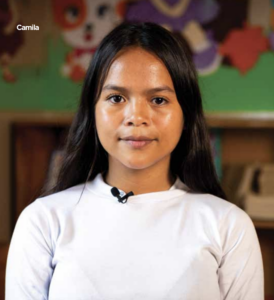 Point and Walk Thru the Bible,” says Camila. “You can see that they are invested and you can tell that they want to learn more. As soon as they see each other coming out of Sunday School class, they’re talking about what they learned, what handsign they learned,” she says. “It’s important for kids to learn the Bible to know the love of Christ. Many of these children [at Point] come from unbelieving families, and our hope and prayer is that they grow up to love the Lord and serve Him,” she says.
Point and Walk Thru the Bible,” says Camila. “You can see that they are invested and you can tell that they want to learn more. As soon as they see each other coming out of Sunday School class, they’re talking about what they learned, what handsign they learned,” she says. “It’s important for kids to learn the Bible to know the love of Christ. Many of these children [at Point] come from unbelieving families, and our hope and prayer is that they grow up to love the Lord and serve Him,” she says.
Francis’ father, Antonio, is excited to see Francis learning the Bible and teaching others what she’s learned. Francis has taught her parents and her younger sister the handsigns and storyline of otLIVE and ntLIVE. Antonio says that Francis is reading the Bible, and she likes to share the handsigns with other children because she “wants them to know Christ,” he says.
“As a father,” says Antonio, “my desire first is that I want my children to know the Lord, to grow in the Lord, because as the Bible says, ‘what does it benefit a man if he loses his soul?’”
“What has surprised me the most about this process of learning the Bible,” says Dr. Ivan, “is how easily the children can learn it and how history is engraved on their hearts and in their minds. It is something they will not forget,” he says.
Dr. Ivan also believes this way of teaching the Bible is contagious. “The children are teaching their mothers and fathers. They will teach another child, and then another child wants to learn it. They go to another church or to the public school, and people want to know what they’re doing. I’ve even learned some of the handsigns myself, just watching the children. And it’s had a fantastic effect on the teachers. We are the only ones in Honduras teaching the Bible this way. It is completely unique,” he says.
“We have to work together,” says Dr. Ivan. He recommends that ministries working with children and that need to breathe new life into their Bible teaching should explore a partnership with Walk Thru the Bible. By working together, we can impact more children, more lives, for the Kingdom of God, he says.
“To Walk Thru the Bible donors, I would say thank you. The kingdom of God needs people like you to make ministry possible,” he says. “We cannot reach poor communities with the gospel, we cannot teach children the Word of God, if there are no strategies such as otLIVE and ntLIVE. Seeing the children in each neighborhood wearing a different color of shirt, learning the Bible storyline and the handsigns, teaching their parents and siblings and friends, sharing the gospel, means that there is an internal change in them.
“And it is our hope that one day, these children we are teaching about Jesus and the Bible will have the ability to say no to a gang. If we continue to share Jesus with the children, the gangs will have no one to recruit. If we share Jesus with them and teach them the Bible, we will have whole families coming to the feet of Christ.”

Walk Thru the Bible and instructor Ishmael Mutumwa are helping kids in Limpopo, South Africa, live God's Word!
Read More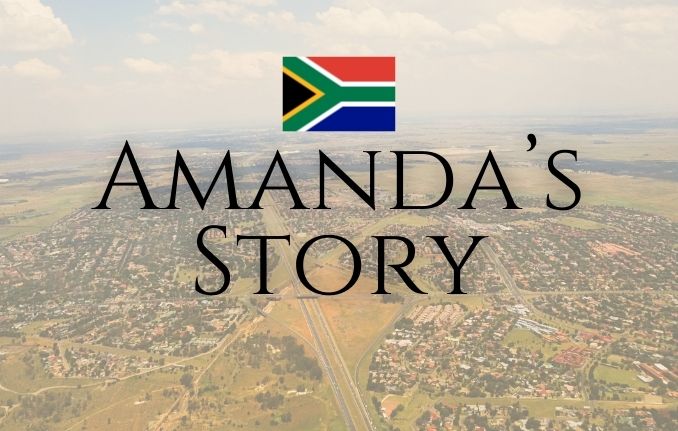
“Because of what God has done for me and in me, and because of Walk Thru the Bible, I can see a clearer path of where He was chiseling me to become who He made me to be. He is creating me to be a woman of valor, a catalyst who can help others see Him as He really is."
Read More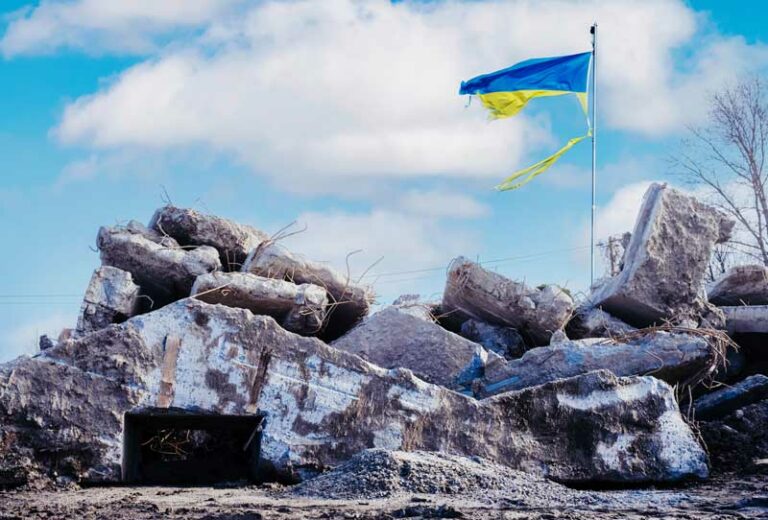
God is making Himself known around the world through the work of Walk Thru the Bible—from dusty playgrounds in Liberia to gang neighborhoods in Honduras and yes, even in bomb shelters in Ukraine.
Read More